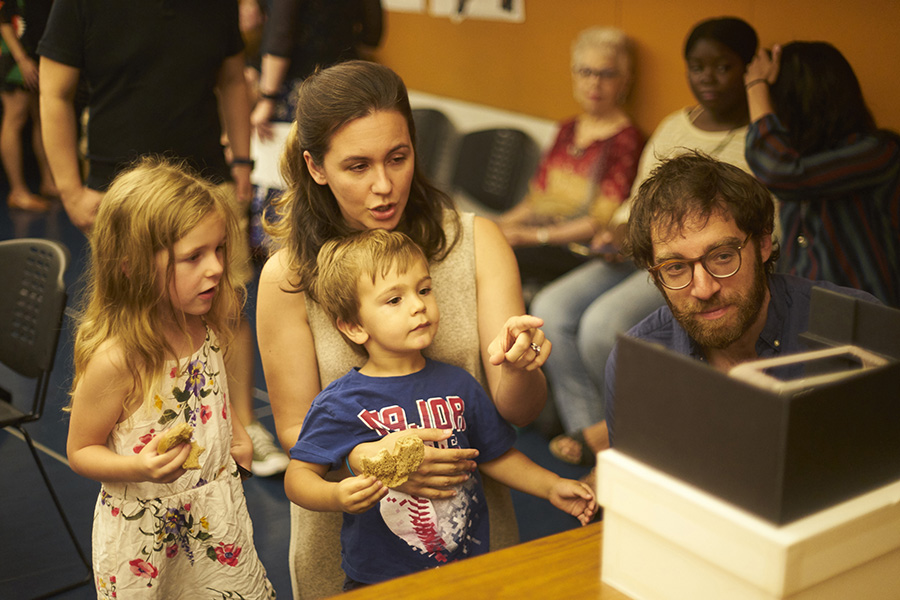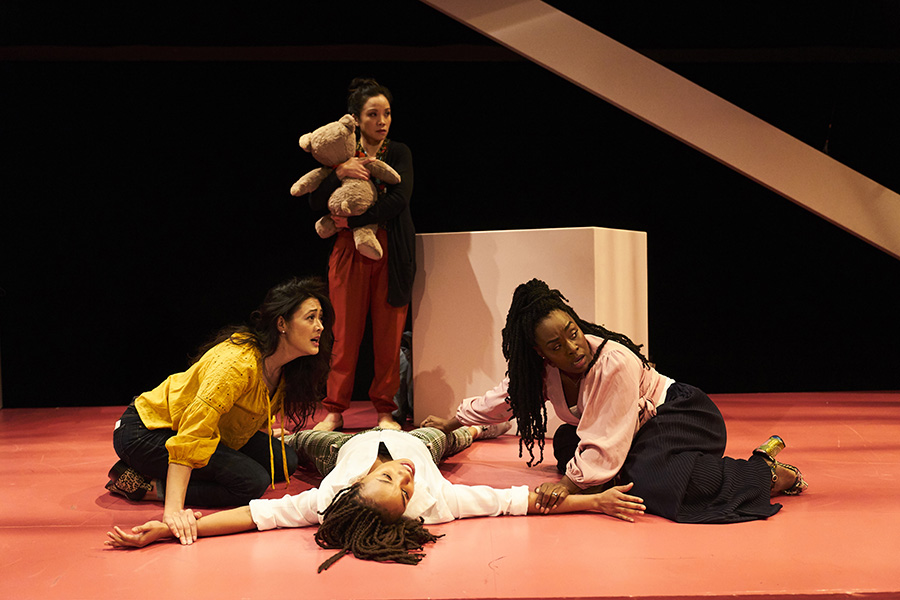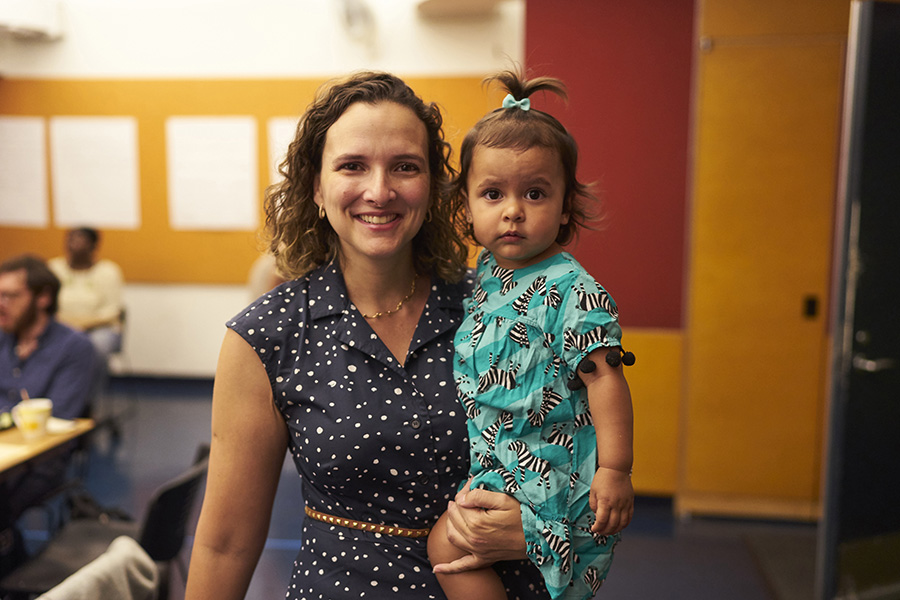This is part of a package of stories, Care for Caregivers.
The theatre field is not built for parent artists. Six-day workweeks, 12-hour tech days, last-minute schedule changes—it’s almost like we don’t want parents working in theatre. It is especially challenging for parents who are playwrights, directors, designers, stage managers, and actors whose careers depend on working freelance in several organizations around the country and the world.
Parent Artist Advocacy League for Performing Arts + Media (PAAL), founded by Rachel, seeks to elevate the national standard of care for caregivers, and to that end led the first national summit dedicated to caregiver support in the performing arts last December, in partnership with the Public Theater. And the Playwrights Realm, an Off-Broadway theatre co-led by Roberta, is centered around equity and inclusion and deeply committed to reflecting the full spectrum of humanity. As the socioeconomic impact of caregiving increases exponentially when other factors are involved, including for artists who are single parents and/or people of color, PAAL and the Playwrights Realm seemed like natural partners in envisioning a full production that publicly committed to radical parent support. With our missions aligned, the Radical Parent-Inclusion Project (RPI) was born.
It began like most great revolutions: with an Excel spreadsheet. As the Realm’s team finessed the production budget for Mothers, a new play by Anna Moench (parent to Hank, and a new baby coming in 2020), with PAAL’s guidance we compiled a separate budget for RPI. Since parent support varies from family to family, and we did not have the whole team in place, we had to imagine what kind of support our parent artists might need. Some of it included known expenses (family-friendly housing for Moench and her family), but many of the line expenses were educated guesses (like on-site childcare during tech, which ended up not being needed for our group of parent artists).
How did we fund the RPI? Honestly, it was a mix of careful planning, plus a good back-up plan (doesn’t that describe most great endeavors?). There were many aspects of the project we had to commit to before we had funding fully in place, including engaging PAAL as a paid consultant and securing family-friendly housing. With a strong record of fiscal responsibility, the Realm has amassed a surplus, which can be used for exciting opportunities beyond the scope of regular programming. The Playwrights Realm decided to use surplus funds to cover RPI costs in case we were not able to secure additional funding.
Once we had a budget and a backup plan firmly in place, we called Emily Sproch at the Howard Gilman Foundation, which has been a staunch supporter of the Realm. We created a proposal with a request for special funding to support RPI, above what the Playwrights Realm already received annually from Gilman, as we did not want to cannibalize existing funds. Once they committed to being a lead partner, we reached out to targeted individuals and institutions. In the end, the RPI was underwritten with special support from the Howard Gilman Foundation, the James S. & Merryl H. Tisch Foundation, Lynn & Stephan Solomon, the New 42nd Street, and Venturous Theater Fund of the Tides Foundation.

Hurdles and Make-Ups
Of course, not everything in RPI went as planned, and we learned a lot during the process. Here are some of the main challenges that we faced.
Hiring parents intentionally: To comply with the law, caregiver support was transparently offered to all potential hires without inquiry into their personal family situation. Our outreach to caregivers consisted of publicly including the elements of parent support in employment notices—such as the audition notice, offers, etc.—so that parents looking for employment could know that support existed and potential hires could have agency in how they inquired about available support. We felt it was important to have parents represented in as many sections of the production as possible, and though not everyone involved turned out to be a parent artist, we successfully hired caregivers across all production disciplines, including a producer, playwright, director, stage manager, two of five actors, and three out of four designers.
Space liability/security consideration: Declaring that “children are welcome in the space” requires an investment of time to develop a sustainable protocol in order to protect both children and the production, but it is possible. PAAL briefed staff on state requirements, and the Realm producers requested New 42’s requirements for coverage, guest policy, and approval. “As a stage manager, it did create one more thing to juggle the schedule and needs of actor/designers with kids,” stage manager and parent, Christine Daly, later said. But, she added, “I felt PAAL and management understood that from the beginning and provided great support in that arena as well.” We established an exclusive partnership with Broadway Babysitters for on-site care, as the company has mobile insurance coverage for any site, including theatres. And we established a specific channel of communication among parents, stage management, and producers, who would then contact on-site security. While setting up this system from scratch was challenging, the Realm now has a sustainable protocol that can be implemented safely and efficiently in the future.
Additional rehearsal week: One financial hurdle we encountered came when we decided to add an additional rehearsal week. This was the Realm’s first venture into the five-day rehearsal process; most Actors Equity contracts permit up to six days of rehearsal, with only one day off per week. But since having two days off can be beneficial for work/life balance, not only for caregivers but for all artists, we decided to rehearse for five days, six hours each day, for a total of 30 rehearsal hours per week. Many theatres successfully use the five-day rehearsal schedule without adding a week, but because we were working on a world premiere of a new play, we consciously decided to make up those days by adding a full extra week of rehearsal, which added a little more than $8,000 to the budget (or 3 percent of the total production budget).
Free audition childcare: One of the reasons this field is so difficult for parent artists is that it can cost them not only to take jobs but also simply to interview. Free childcare at auditions can lower this barrier, so it seemed like a no-brainer. In practice, however, we found that the ratio of cost to people served was not great when implemented for just one production, as we had to engage babysitters for three full days of auditions without guarantees of how many parents would use the service. For the artists who used the service, it had a significant impact, so we are determined to find a model that works. This summer, the Realm will do their Equity Principal Auditions (EPAs) jointly with several Off-Broadway theatres. We are already in talks with partner theatres, PAAL, and Broadway Babysitters to offer childcare during those appointments so we can increase the impact while lowering the cost for individual theatres.

How’d We Do?
In PAAL’s interviews with parents, it was all too common to hear stories in which caregiver needs received blank stares or inconsistent, reckless responses that resulted in unpredictability, silencing, or shame. These stories showed that it wasn’t enough to enter a workplace and simply start adjusting budgets and practices; a foundation of support had to be created within the work culture to make comprehensive change. That’s why Rachel gathered the entire staff of the Realm for PAAL’s innovative Compassion Training. This curriculum, available to PAAL institutional members, consists of guided dialogue about concerns, socioeconomic and ethical relevance, and examples of best practices in interactions. Caregivers involved in RPI later expressed that they felt unprecedented support from every staff member they came in contact with, who not only welcomed conversations on caregiving responsibilities but also knew how to move the conversation forward. Lighting designer and parent Porsche McGovern put it best: “It was nice to be on a show where talking about my kid was okay, encouraged even.”
The five-day workweek was lauded as a more humane and sustainable practice that benefited all participants, caregiver and otherwise, in multiple dimensions of their life: logistically, financially, professionally, and artistically. Said one collaborator, “The quality of my productivity was able to remain at a high impact and fast pace to keep up with the production, because I didn’t need to waste my creative and critical thinking resources on hiding or super-solving my family needs.”
The intersectional impact of RPI is one of its greatest successes. Of the individuals who received caregiver support, 71 percent were female-identifying, and more than half were women of color. All recipients reported feeling both an ease in the financial burden of working in the performing arts and an increased ability to focus on their work, with one caregiver reporting that RPI is what allowed them to take the employment at all. The range of impact included support for artists with elder care responsibilities. Said actor Maechi Aharanwa, “I was able to work with more ease because my constant worry about caring for my elderly father greatly decreased.”
To complete the circle, we wanted to extend the caregiving support to audiences as well. Past research indicated that childcare matinees were more popular in theory than in practice, so we made strategic adjustments to improve outcomes. We activated parents in the PAAL network, opened up registration for children as young as three months, and adjusted the matinee to 4 p.m. Based on feedback from parents at the event, we know that the time adjustment became a key factor in their decision to attend, as it was a showtime that was conscientious of family schedules. Fifty percent of the children whose parents attended the matinee were under one year old, demonstrating the great need for help for new parents. The Playwrights Realm covered the cost of sitters, and childcare was provided by Broadway Babysitters at no extra charge for audience members on-site at New 42 Studios. We surpassed the maximum registration, with 22 children, and we also sold out the matinee itself, exceeding all expectations.
The total cost of RPI during Mothers was close to $38,000, with almost 50 percent of that going to artist and family travel and housing. That is about 13 percent of the whole production budget and only 2 percent of the Realm’s yearly budget.
RPI also served as a useful model for PAAL’s work across the country at theatres of all sizes. Most institutions want to support caregivers, but don’t have the time or resources to create effective systems. To this end, PAAL has launched both institutional and individual membership opportunities, which help member theatres start their support initiatives, including childcare funds, compassion training for staff, childcare matinees, and supportive work culture practices. PAAL acts as a centralized hub so that institutional support for caregivers isn’t created by whim, chance, or contingency, but through compassionate structures with sustainable benefits for all contributors.
Money and hours are useful metrics of success for a project like this. But measured in terms of feedback from parent artists, RPI so far has been a smashing success. Moench, the Mothers playwright, called it the “most groundbreaking experience in my career since becoming a parent. From the beginning of the process, I was made to feel comfortable asking for things that would make my involvement in the process easier on my family and myself. This had the unexpected effect of empowering me to have a stronger voice as an artist as well.”
Roberta Pereira is the producing director of the Playwrights Realm in New York City. New York-based actor Rachel Spencer Hewitt is the founder of Parent Artist Advocacy League for Performing Arts + Media.


